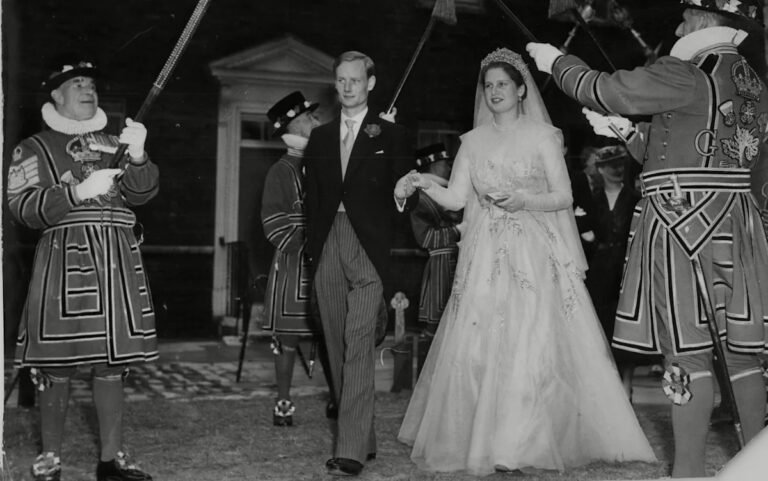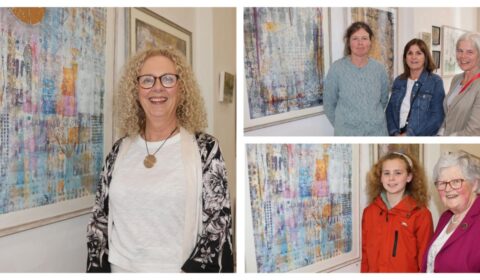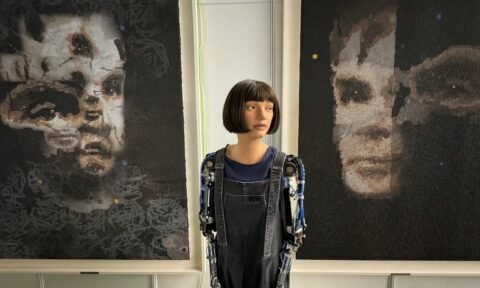Helen Lady Pickthorn, who has died aged 98, restored the artistic reputation of her grandfather, the post-impressionist painter Alexander Mann (1853-1908), and helped to revive interest in the works of Robert Smith Surtees, the Victorian comic writer of fox-hunting novels and creator of Mr Jorrocks, the Cockney grocer.
An income derived from Mann, Byars & Co, his family’s textiles business in Glasgow, enabled Alexander Mann to live in Paris and study painting under Carolus-Duran, and relieved him permanently of the need to make a living by the sale of his work. Consequently, when he died in 1908, a great proportion of his paintings passed to his widow, and in due course to Helen Pickthorn, his only grandchild.
Influenced, as were many other painters of his day, by the landscapes and rustic subjects of Jules Bastien-Lepage and Jean-François Millet, Mann showed his work at the annual exhibitions of the Royal Glasgow Institute of Fine Arts, and his more ambitious paintings at the Royal Academy in London. He also showed pictures in London at the Royal Society of British Artists, and with the New English Art Club.

Helen’s grandfather Alexander Mann
Some of the paintings exhibited were acquired by private collectors and public collections, and in 1909 a memorial exhibition of his work was held at the Royal Glasgow Institute. But because many of his best pictures had never been shown or offered for sale, and as he had never courted popular prestige, Mann’s reputation as a painter outlasted his lifetime by only a year or so.
Seventy-five years after his death, having inherited the bulk of his pictures, Helen Pickthorn presented Mann’s work to the public afresh. In collaboration with Andrew McIntosh Patrick of the Fine Art Society, where Mann had himself exhibited, she mounted an acclaimed exhibition, in Glasgow and London, of more than 70 of Mann’s paintings, the largest assemblage of his work to be seen since the Glasgow show of 1909.

‘Picking up Silver and Gold’, Alexander Mann, oil on canvas, 1906 – Alamy
Having successfully put her grandfather back on the map, Helen Pickthorn helped do the same for Surtees. The R S Surtees Society was set up by her husband, Sir Charles Pickthorn, Bt, in response to a tease by Michael Wharton (Peter Simple) in the pages of the Telegraph, with a view to republishing Surtees’s books, all long out of print. The idea had first been floated by Sir Charles’s father in the 1940s.
Helen Pickthorn entered into the enterprise with enjoyment and gusto, as with a handful of like-minded friends she and Sir Charles set about reprinting the books, commissioning introductions for successive volumes from Molly Keane, Rebecca West, Enoch Powell, Robert Blake, Raymond Carr, Auberon Waugh and other noted figures who saw the point of Surtees’s comic sporting characters and their world.

Robert Smith Surtees – Hulton Archive/Getty Images
Following Sir Charles’s death in 1995, Helen Pickthorn took over as chairman of the society’s committee and continued its programme, selecting other out-of-print writers as well as Surtees for reprinting.
Committee meetings were held at Nunney Manor Farm, her house in Somerset, and she re-energised the society’s annual dinner at the Carlton Club in London with first-rate speakers. In 2011 she handed the reins over to younger hands, and the society continues to thrive.
Helen Antonia Mann was born at home in George Street, London W1, on July 31 1927, the only child of James Mann and his wife Mary, née Cooke. James was then Assistant Keeper of the Wallace Collection in Manchester Square; he progressed to be Director of the Wallace Collection, Master of the Armouries at the Tower of London, Surveyor of the King’s (and later Queen’s) Works of Art, and a knight.

Waiting, Alexander Mann, oil on panel
Helen’s mother was the daughter of a clergyman, the Reverend Professor G A Cooke, the Oxford theologian who became Regius Professor of Hebrew and a canon of Christ Church, and who implanted in his grand-daughter Helen, when she stayed with him and her grandmother in Oxford, a fascination with the lives of the saints that would eventually lead her to become, in middle age, a Roman Catholic.
Helen attended a nursery school near Hyde Park, and on Sundays would be taken by her father to the Wallace Collection, where she remembered him checking that the gallery attendants on duty were alert at their posts. Aged six, she was sent to live in the country with her mother’s sister Margot, who was married to the Harmsworth press magnate Cecil King and had small children, at Culham Court, Remenham, near Henley-on-Thames.

Helen Pickthorn and her husband saw the point of Surtees’s comic characters, among them Mr Jorrocks, the Cockney grocer with a passion for the chase
Not caring for life with the Kings, within a year Helen had prevailed upon her parents to let her live instead with her father’s unmarried sisters Jane and Mary, who lived in more cosy circumstances, without other children, on the other side of the Thames beyond Henley. Thereafter, she saw her parents often and spent holidays with them, but from the age of seven until she married Charles Pickthorn at 24 she mostly lived with her aunts.
Except for two terms at Oxenfoord Castle school for girls in Scotland during the war (her Oxenfoord contemporary, Cherry Drummond, later the 16th Baroness Strange, became a friend for life), Helen was schooled at home.
Time spent with her father was instructive too, as when one summer she joined him in Italy at Mantua, to see him work on an exceptional group of Gothic and Renaissance armour from the Gonzaga armoury that he had discovered there.

‘By the Findhorn’, Alexander Mann, oil on canvas, 1886; acquired in 2002 by the Kelvingrove Art Gallery in Glasgow – Alamy
After the war, with private coaching, Helen gained a place at Girton College, Cambridge, to read English, later switching to History. The Cambridge geologist and polar explorer James Wordie was her father’s cousin, and it was through him that she met Charles Pickthorn at a May ball.
Charles was a son of the retired president of Corpus Christi College, Kenneth Pickthorn, Conservative MP for Cambridge University, who was made a baronet in 1959.
Following their marriage, in 1951, at the Tower of London (Helen’s father was now Master of the Armouries), while Charles exchanged practice at the Bar for Schroders, the merchant bank, Helen worked in education, initially teaching English to foreign students. She wrote two books in the field: Student Guide to Britain (1966), and Locked Up Daughters (1968), about the opening-up of education to girls.

The Sheepfold by Alexander Mann
For a time, she served as parliamentary liaison officer at the Council for Education in the Commonwealth, and she chaired the board of governors of More House School, the Catholic girls’ school, which, with support from Cardinal Heenan, she and her fellow governors saved from closure. Having acquired, in 1975, the house at Nunney, Downside Abbey became a focus of Helen Pickthorn’s church life.
Like her husband, Helen Pickthorn had a passion for Conservative politics. Foreign affairs provided another keen interest, and she was fascinated by the work of the Foreign Office. Sharp, funny, thoughtful, informed and well able to charm, she was an entertaining conversationalist who enjoyed a lively discussion and would defend her views unflinchingly in argument.
Helen Pickthorn is survived by a son and two daughters.
Helen Pickthorn, born July 31 1927, died August 1 2025





